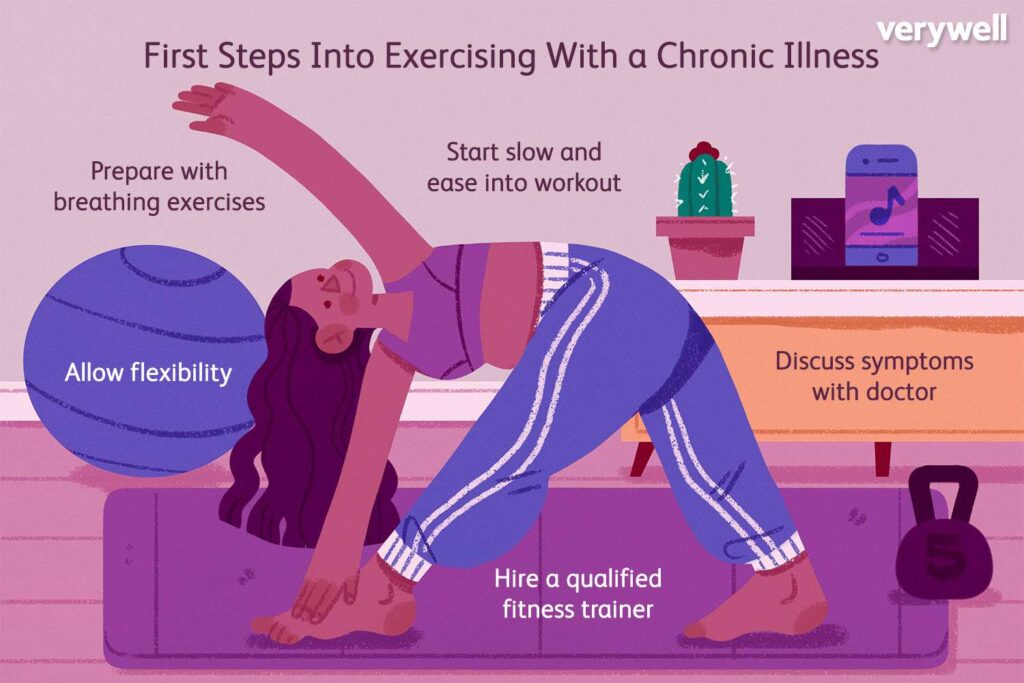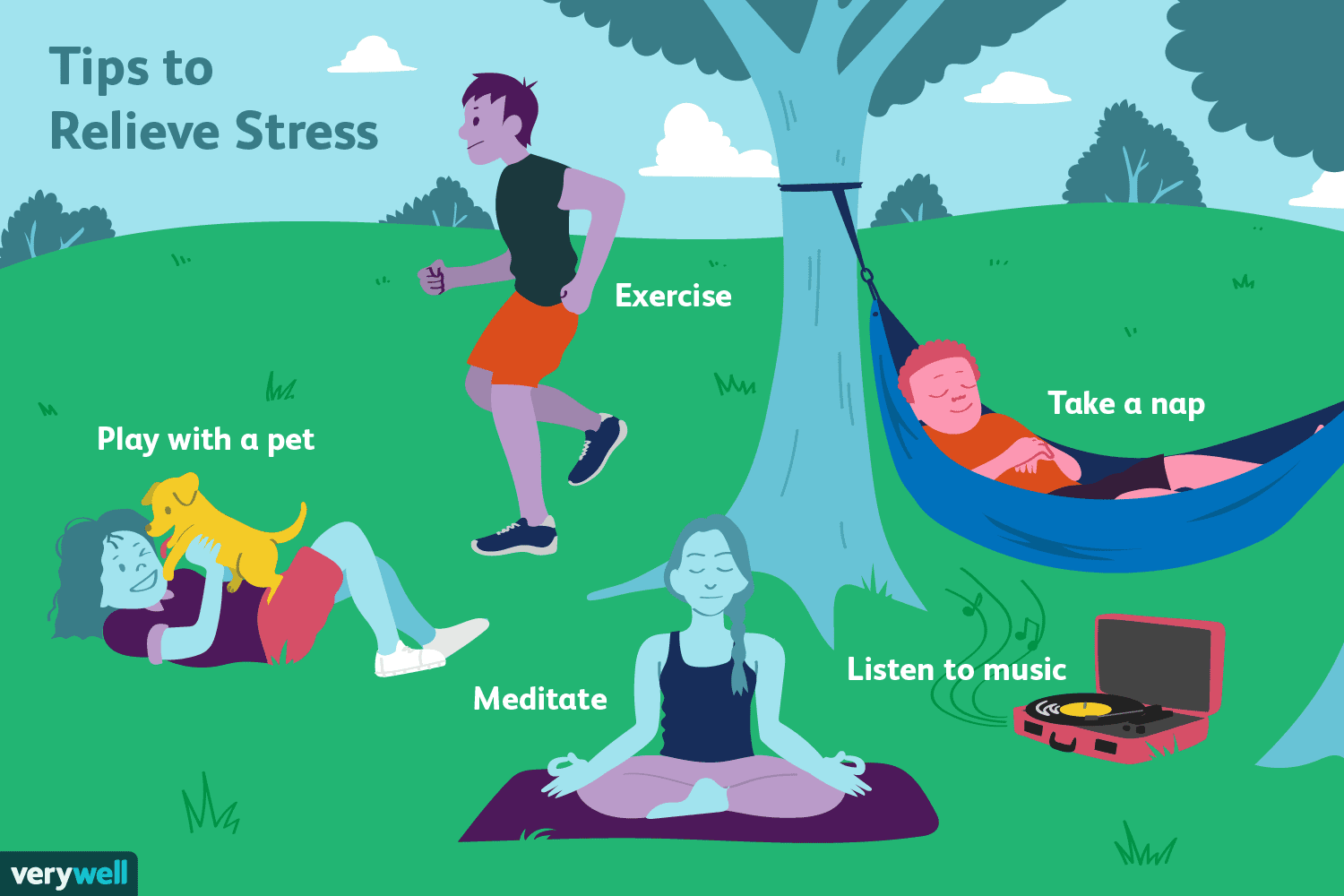Exercise Your Way Out Of Stress And Weight Gain: A Comprehensive Guide

Feeling stressed and noticing a few extra pounds creeping on? Well, you’re not alone. Stress and weight gain often go hand in hand. But don’t worry, there’s a solution! In this comprehensive guide, we’re going to show you how exercise can be your ultimate weapon against stress and weight gain. So, are you ready to take control of your health and happiness? Let’s dive in!
Stress can wreak havoc on our bodies, both physically and mentally. It can lead to emotional eating, lack of motivation, and even insomnia. And unfortunately, these are all factors that can contribute to weight gain. But here’s the good news: exercise has the power to combat these negative effects. By engaging in regular physical activity, you’ll not only burn calories but also release those feel-good endorphins that combat stress. In this guide, we’ll explore different types of exercise that are particularly effective in reducing stress and shedding pounds.
From high-intensity interval training to yoga and everything in between, we’ll cover a wide range of exercise options for you to choose from. Whether you prefer hitting the gym, going for a run outdoors, or simply finding time for a quick workout at home, we’ve got you covered. Not only will exercise help you manage stress and lose weight, but it will also improve your overall physical and mental well-being. So stick with us as we break down the benefits of exercise and provide you with practical tips to incorporate it into your daily routine. Remember, you have the power to exercise your way out of stress and weight gain!

Understanding Stress and Weight Gain
Stress is a common part of life, and it can have a significant impact on your overall well-being. One of the most notable effects of stress is weight gain. Understanding the connection between stress and weight is crucial for managing both effectively.
The Impact of Stress on Weight
When you experience stress, your body releases a hormone called cortisol. This hormone is essential for survival, as it helps your body respond to stressful situations. However, prolonged exposure to high levels of cortisol can lead to weight gain.
Cortisol increases your appetite, particularly for high-calorie, sugary, and fatty foods. This can lead to overeating and the consumption of unhealthy foods, ultimately resulting in weight gain. Additionally, stress can disrupt your sleep patterns, which can further contribute to weight gain.
The Connection Between Stress and Emotional Eating
One common coping mechanism for stress is emotional eating. Many people turn to food for comfort or as a way to distract themselves from negative emotions. This emotional connection with food can lead to overeating and the consumption of unhealthy foods.
When we eat in response to stress, our bodies release endorphins, which provide a temporary sense of relief and pleasure. This reinforces the connection between stress, emotional eating, and weight gain. Breaking this cycle is essential for managing stress and maintaining a healthy weight.
Effects of Stress on Metabolism
Stress can also have a significant impact on your metabolism. When you’re under stress, your body goes into a fight-or-flight response, which can slow down your metabolism. This means that your body is less efficient at burning calories, potentially leading to weight gain.
Additionally, chronic stress can disrupt the balance of hormones in your body, such as insulin and leptin. These hormones play a crucial role in regulating your appetite and metabolism. When their balance is disrupted, it can contribute to weight gain and make it harder to lose weight.
Benefits of Exercise for Stress Relief
Exercise is a powerful tool for managing stress and improving your overall well-being. Engaging in regular physical activity has numerous benefits for both your mental and physical health. Here are some ways exercise can help you relieve stress:
Release of Stress-Reducing Hormones
When you exercise, your body releases endorphins, also known as “feel-good” hormones. These endorphins act as natural painkillers and mood elevators, providing an immediate boost to your mood and reducing feelings of stress and anxiety.
Regular exercise has been shown to increase the production of endorphins, leading to long-term benefits for managing stress. The more you exercise, the more your body becomes accustomed to producing these stress-reducing hormones, resulting in improved stress management.
Improved Sleep Quality and Stress Reduction
Stress can often disrupt your sleep patterns, leading to insufficient or poor-quality sleep. Lack of sleep can further exacerbate stress and contribute to weight gain. However, exercise can help improve your sleep quality and reduce stress.
Studies have shown that regular exercise can promote better sleep by increasing the amount of deep sleep you get each night. This deep sleep is essential for restoring your body and mind, allowing you to wake up feeling refreshed and ready to tackle the day.
Enhancement of Mood and Reduction of Anxiety
Exercise has been proven to have a positive impact on your mood and overall mental well-being. Physical activity stimulates various brain chemicals, including dopamine, serotonin, and norepinephrine, which are known to improve mood and reduce symptoms of anxiety and depression.
Engaging in regular exercise can help you better cope with stressors and uplift your overall mood. Whether it’s going for a jog, participating in a group fitness class, or taking a bike ride, finding an exercise routine that brings you joy can significantly contribute to stress relief.

Types of Exercise for Stress Reduction
Different types of exercises can help in reducing stress and promoting overall well-being. Whether you prefer high-intensity workouts or more mindful activities, incorporating a variety of exercises into your routine can keep you motivated and help you manage stress effectively. Here are some types of exercises to consider:
Aerobic Exercises for Stress Relief
Aerobic exercises, also known as cardio workouts, are great for relieving stress. These exercises increase your heart rate and promote the release of endorphins, enhancing your mood and reducing stress levels. Some examples of aerobic exercises include:
- Running or jogging
- Swimming
- Cycling
- Zumba or dance classes
- HIIT (High-Intensity Interval Training)
- Jumping rope
Choose an aerobic activity you enjoy and aim to engage in it for at least 30 minutes, three to five times a week, to experience the stress-reducing benefits.
Strength Training and Stress Relief
Strength training not only helps build muscle and increase strength but also provides stress relief. Lifting weights or using resistance bands can help release tension in your muscles and improve your overall mood. Additionally, the sense of accomplishment that comes with strength training can boost your self-confidence and reduce stress.
Incorporate strength training exercises into your routine two to three times a week. Focus on working different muscle groups to ensure balanced strength development. Remember to start with lighter weights and gradually increase as you become more comfortable with the exercises.
Mind-Body Exercises for Reducing Stress
Mind-body exercises focus on integrating the connection between your mind and body. These exercises not only help reduce stress but also improve your overall well-being. Here are some mind-body exercises to consider:
- Yoga: Practicing yoga combines physical postures, breathing techniques, and mindfulness to promote relaxation and stress reduction.
- Pilates: Pilates focuses on core strength, flexibility, and body awareness, promoting a sense of calm and reducing stress.
- Tai Chi: This ancient Chinese martial art combines slow, flowing movements and deep breathing, promoting relaxation and reducing stress levels.
- Meditation: Engaging in meditation can help calm your mind, reduce anxiety, and improve your ability to focus.
Incorporating these mind-body exercises into your routine can provide a holistic approach to stress management and overall well-being.
Creating an Exercise Routine for Stress Management
Creating a consistent exercise routine is key to managing stress effectively. Here are some steps to help you develop a routine that works for you:
Setting Realistic Goals
Start by setting realistic goals for your exercise routine. Consider your current fitness level, schedule, and preferences. Setting attainable goals will help you stay motivated and avoid overwhelming yourself. Whether your goal is to exercise for 30 minutes a day or complete a specific number of workouts per week, make sure it is achievable for you.
Choosing Activities You Enjoy
To stick to your exercise routine, it’s essential to choose activities that you genuinely enjoy. Find exercises that bring you joy and make you feel good. This could be anything from dancing and hiking to playing a sport or joining a fitness class. When you enjoy what you’re doing, it becomes easier to stay motivated and committed to your routine.
Scheduling Exercise into Your Daily Routine
Make exercise a priority by scheduling it into your daily routine. Set aside specific times each day or week for physical activity. Treat these exercise sessions as non-negotiable appointments with yourself. Consistency is key to reaping the benefits of exercise for stress management, so make it a habit to move your body regularly.

Exercise and Weight Loss
In addition to its stress-reducing benefits, exercise plays a vital role in weight loss. If you’re looking to shed some extra pounds, incorporating exercise into your routine is essential. Here’s how exercise affects weight loss:
How Exercise Affects Weight Loss
Exercise helps create a calorie deficit, which is necessary for weight loss. When you engage in physical activity, you burn calories, and if you consistently burn more calories than you consume, you will lose weight. While diet plays a significant role in weight loss, exercise complements it by increasing the number of calories burned.
Regular exercise also helps maintain muscle mass while losing weight. This is important because muscle burns more calories at rest than fat, contributing to a higher metabolic rate. By incorporating exercise into your weight loss journey, you can improve your body composition and boost your overall metabolism.
Combining Cardiovascular and Resistance Training for Optimal Weight Loss
For optimal weight loss results, it’s best to combine cardiovascular exercises with resistance training. Cardiovascular exercises, such as jogging, cycling, or aerobic classes, help burn calories and improve heart health. On the other hand, resistance training exercises, such as lifting weights or using resistance bands, help build muscle and increase your metabolic rate.
Including both types of exercises in your routine can create a well-rounded approach to weight loss. Aim for a mix of cardiovascular and strength training exercises throughout the week to maximize your calorie burn and maintain muscle mass.
The Importance of Nutrition in Weight Loss
While exercise is essential for weight loss, it’s important to remember that nutrition plays a crucial role as well. You can’t out-exercise a poor diet. To effectively lose weight, you need to create a calorie deficit through a combination of exercise and a balanced, nutritious diet.
Focus on consuming whole, nutrient-dense foods such as fruits, vegetables, lean proteins, whole grains, and healthy fats. Avoid overly processed foods high in added sugars and unhealthy fats, as they can hinder weight loss progress. By fueling your body with quality nutrition, you’ll have the energy and nutrients needed to support your exercise routine and weight loss goals.
Types of Exercises for Weight Loss
When it comes to weight loss, certain types of exercises are more effective at burning calories and promoting fat loss. By incorporating a variety of exercises into your routine, you can maximize your weight loss efforts. Here are some types of exercises to consider:
Cardiovascular Exercises for Burning Calories
Cardiovascular exercises are excellent for burning calories and helping you shed excess weight. These exercises get your heart rate up and increase your calorie burn. Some effective cardiovascular exercises for weight loss include:
- Running or jogging
- Cycling
- Swimming
- Jumping rope
- High-intensity interval training (HIIT)
- Stair climbing
- Dance classes
To maximize weight loss, aim for at least 150 minutes of moderate-intensity aerobic activity, or 75 minutes of vigorous-intensity aerobic activity, per week. Spread these sessions throughout the week to ensure consistency and sustainability.
Strength Training for Building Muscle and Boosting Metabolism
Strength training is crucial for weight loss because it helps build lean muscle mass, which increases your metabolic rate. As mentioned earlier, muscle burns more calories at rest than fat, so the more muscle you have, the more calories you’ll burn throughout the day. It’s important to note that strength training alone may not lead to significant weight loss, but it plays a key role in shaping your body and boosting your overall metabolism.
Include strength training exercises in your routine two to three times a week. Focus on working different muscle groups, such as legs, arms, chest, back, and core, for a well-rounded approach. Remember to start with lighter weights and gradually increase the resistance as your strength improves.
High-Intensity Interval Training for Efficient Weight Loss
High-intensity interval training (HIIT) is a form of exercise that alternates between short bursts of intense activity and recovery periods. This type of workout is highly effective for burning calories and fat in a short amount of time. In addition, the intense nature of HIIT workouts keeps your metabolism elevated even after you’ve finished exercising, resulting in a continued calorie burn.
Incorporate HIIT workouts into your routine one to two times a week. A typical HIIT workout may involve performing exercises, such as sprinting, burpees, jumping jacks, or kettlebell swings, at maximum effort for 30 seconds to one minute, followed by a short recovery period. Repeat this cycle for a total of 15-20 minutes.

Creating an Effective Exercise Plan for Weight Loss
To create an effective exercise plan for weight loss, consider the following factors:
Determining Caloric Needs and Deficits
To lose weight, it’s important to create a calorie deficit by burning more calories than you consume. Start by determining your daily caloric needs based on your age, gender, weight, and activity level. From there, you can establish a calorie deficit that aligns with your weight loss goals.
Aim for a modest calorie deficit of around 500-1000 calories per day. This will result in a gradual weight loss of 1-2 pounds per week, which is considered a healthy and sustainable rate. However, it’s essential to consult with a healthcare professional or registered dietitian before making significant changes to your calorie intake or embarking on a weight loss journey.
Incorporating Different Types of Exercises
To maximize your weight loss efforts, incorporate a combination of cardiovascular exercises, strength training, and HIIT workouts into your exercise plan. By engaging in different types of exercises, you’ll challenge your body in various ways and keep your workouts engaging and effective.
Spread your exercise sessions throughout the week, allowing for adequate rest and recovery time. Aim for at least 150 minutes of moderate-intensity cardiovascular activity, two to three strength training sessions, and one to two HIIT workouts per week. Adjust the intensity and duration of your workouts based on your fitness level and goals.
Progression and Periodization for Continuous Results
To continue seeing progress and prevent plateaus, it’s important to incorporate progression and periodization into your exercise plan. Progression involves gradually increasing the intensity, duration, or resistance of your workouts over time. This challenges your body and ensures that you’re continually pushing yourself.
Periodization refers to dividing your training into cycles or phases, each with a specific focus or goal. This helps prevent overtraining and optimizes your workouts by targeting different aspects of fitness. For example, you might have a phase focused on building strength, followed by a phase focused on improving cardiovascular endurance.
Working with a qualified fitness professional can help you create an exercise plan that incorporates progression and periodization. They can guide you through the appropriate progressions, ensure proper technique, and help you stay motivated and accountable.
Maintaining Motivation and Consistency in Exercise
Staying motivated and consistent with your exercise routine can be challenging, but it’s essential for long-term success. Here are some strategies to help you maintain motivation and consistency:
Setting Realistic Expectations
Setting realistic expectations is crucial for maintaining motivation. Understand that weight loss and fitness goals take time and effort. Avoid comparing yourself to others or setting unrealistic timelines for your progress. Celebrate small victories along the way and focus on the positive changes you’re experiencing.
Finding Support and Accountability
Having a support system can greatly enhance your motivation and consistency. Share your goals with friends, family, or a workout buddy who can provide encouragement and hold you accountable. Consider joining exercise groups or classes to connect with like-minded individuals and enjoy the social aspect of exercising.
Addressing Mental Barriers and Overcoming Plateaus
Along your fitness journey, you may encounter mental barriers or plateaus that can be demotivating. It’s important to acknowledge and address these challenges. Reflect on your reasons for embarking on this journey and remind yourself of the positive impact exercise has on your overall well-being.
If you hit a plateau in your weight loss progress, consider adjusting your exercise routine or seeking guidance from a fitness professional. They can help you modify your workouts, introduce new challenges, or provide strategies to overcome plateaus.

Preventing Injuries during Exercise
To maintain a safe and effective exercise routine, it’s important to prioritize injury prevention. Here are some precautions you can take:
Proper Warm-Up and Cool-Down Techniques
Always start your exercise session with a proper warm-up to prepare your body for the upcoming workout. This can include dynamic stretches, light aerobic activity, or mobility exercises. A warm-up helps increase blood flow, raise body temperature, and loosen up your muscles, reducing the risk of injury.
Similarly, cooling down after your workout is essential for gradually bringing your heart rate and body temperature back to normal. Incorporate static stretches and gentle movements to promote muscle recovery and flexibility.
Using Correct Form and Technique
Using proper form and technique during exercise is crucial for preventing injuries. Improper form can place unnecessary strain on your joints, muscles, and ligaments, increasing the risk of injury. If you’re unsure about the correct form for a particular exercise, consider working with a fitness professional who can provide guidance and ensure you’re performing the exercises safely and effectively.
Listening to Your Body and Resting When Needed
It’s important to listen to your body and rest when needed. Pushing through pain or working out excessively without breaks can lead to overuse injuries and burnout. Pay attention to any discomfort, pain, or unusual sensations during and after exercise. If you experience any pain, modify or stop the exercise and consult with a healthcare professional if necessary.
Rest and recovery days are essential for allowing your body to repair and rebuild. Aim for at least one to two days of rest each week to prevent overtraining and give your body time to adapt to the demands of exercise.
Incorporating Mindfulness and Relaxation Techniques
Exercise is not just about physical activity; it’s also an opportunity to cultivate mindfulness and relaxation. By incorporating mindfulness and relaxation techniques into your exercise routine, you can further enhance stress reduction and weight management. Here are some practices to consider:
Mindful Breathing and Meditation
Mindful breathing and meditation can help calm your mind and reduce stress and anxiety. Before or after your exercise session, take a few moments to focus on your breathing. Breathe deeply, inhaling through your nose and exhaling through your mouth, paying attention to each breath.
You can also incorporate meditation into your routine by finding a quiet space and spending a few minutes in contemplation or guided meditation. This can help shift your focus inward, improve mental clarity, and promote a sense of peace and relaxation.
Yoga and Stretching for Stress and Weight Management
Yoga and stretching exercises not only promote flexibility and mobility but also provide relaxation and stress relief. Incorporate yoga poses or stretching routines into your exercise routine, or dedicate specific sessions solely to yoga or stretching.
Yoga combines physical postures, breathing techniques, and mindfulness, providing holistic benefits for stress management and weight loss. Stretching exercises can help release tension in your muscles and promote relaxation, allowing you to unwind after a challenging workout.
Incorporating Relaxation Techniques into Exercise
During your exercise sessions, incorporate relaxation techniques to enhance the stress-reducing benefits. Practice diaphragmatic breathing while performing your exercises, focusing on deep inhales and exhales. Engage in positive self-talk and affirmations to shift your mindset and promote a positive outlook.
You can also turn your workouts into a form of active meditation by fully immersing yourself in the present moment. Pay attention to the sensation of your muscles working, the rhythm of your breath, and the feeling of your body moving. This mindful approach to exercise can further enhance stress reduction and overall well-being.
Seeking Professional Guidance and Support
If you’re new to exercise or have specific health concerns, seeking professional guidance and support is highly recommended. Working with qualified professionals can help ensure your safety, tailor exercises to your individual needs, and provide specialized knowledge and expertise. Consider the following professionals:
Consulting with a Fitness Trainer or Exercise Specialist
A fitness trainer or exercise specialist can create a personalized exercise plan based on your goals, fitness level, and any medical considerations. They can guide you through proper technique, provide motivation and accountability, and help you progress safely and effectively.
Seek out certified fitness professionals who have experience working with individuals with similar goals or health conditions. Whether you prefer one-on-one training sessions or group classes, a fitness trainer can be an invaluable resource on your fitness journey.
Working with a Registered Dietitian for Nutritional Guidance
Nutrition plays a crucial role in weight management and overall health. If you need guidance on creating a balanced, nutritious diet plan, consider working with a registered dietitian. They can assess your dietary habits, provide personalized recommendations, and help you make sustainable changes to support your exercise and weight loss goals.
A registered dietitian can also address any specific dietary needs or restrictions you may have, such as food allergies, intolerances, or medical conditions. They can work in conjunction with your exercise routine to ensure you’re fueling your body properly and optimizing your results.
Considering Psychological Support for Stress Management
If you find that stress is significantly impacting your life, considering psychological support can be beneficial. Stress management techniques, such as cognitive-behavioral therapy (CBT), can help you identify and address sources of stress and develop effective coping strategies.
A licensed therapist or counselor can provide guidance in managing stress and improving overall mental well-being. They can help you navigate the emotional aspects of stress and weight gain, providing tools and techniques to promote resilience and overall stress reduction.
Tracking Progress and Celebrating Achievements
Tracking your progress and celebrating achievements along your fitness journey can provide motivation and a sense of accomplishment. Here are some ways to track your progress:
Collecting Data and Setting Milestones
Keep track of your exercise sessions, noting the duration, intensity, and type of activities performed. You can use fitness apps, wearable devices, or a simple journal to record your workouts. Monitoring your progress allows you to see improvements over time and helps you stay accountable to your goals.
Set small milestones along the way to track your progress. Celebrate each milestone reached, whether it’s completing a certain number of workouts, increasing the weight lifted, or reaching a specific distance in a run. Recognizing and celebrating these achievements will keep you motivated and reinforce your dedication to your exercise routine.
Rewarding Yourself for Achievements
As you reach your milestones and achieve your goals, reward yourself for your hard work and commitment. These rewards don’t have to be extravagant; they can be as simple as treating yourself to a relaxing bath, buying a new workout outfit, or enjoying a guilt-free rest day. These small rewards provide positive reinforcement and help you stay motivated on your fitness journey.
Using Visualization and Positive Affirmations
Visualization and positive affirmations can be powerful tools in maintaining motivation and focus. Take a few moments each day to visualize yourself reaching your fitness goals and feeling the positive impact of exercise on your life. Repeat positive affirmations, such as “I am strong and capable” or “I am dedicated to my health and well-being,” to boost your confidence and reinforce your commitment.
Embracing a positive mindset and believing in your ability to reach your goals is essential for long-term success. Use visualization and positive affirmations to cultivate this mindset and stay committed to your exercise routine.
Long-Term Strategies for Stress and Weight Management
Managing stress and maintaining a healthy weight require long-term strategies and lifestyle changes. Here are some strategies to consider:
Maintaining a Balanced Lifestyle
In addition to exercise, maintaining a balanced lifestyle is crucial for stress and weight management. Aim to prioritize self-care activities, such as getting enough sleep, practicing relaxation techniques, and engaging in hobbies or activities that bring you joy. Strive for a healthy work-life balance to reduce stress and prioritize your overall well-being.
Continuing Regular Exercise Habits
Consistency is key to reaping the benefits of exercise for stress and weight management. Once you establish an exercise routine that works for you, make it a non-negotiable part of your daily or weekly schedule. Even on days when you’re not feeling motivated, commit to moving your body in some way, whether it’s a full workout or a short walk.
Strategies for Coping with Potential Setbacks
It’s important to acknowledge that setbacks may occur along your fitness journey. Life can sometimes throw unexpected challenges your way, leading to disruptions in your exercise routine or temporary weight fluctuations. Instead of viewing setbacks as failures, see them as opportunities for learning and growth.
When faced with setbacks, practice self-compassion and focus on getting back on track rather than dwelling on the setback itself. Reach out to your support system, revisit your goals, and remind yourself of the progress you’ve already made. Flexibility and resilience will help you overcome setbacks and continue on your path to stress and weight management.
Conclusion
Exercise is a powerful tool for combating stress and managing weight. Through the release of stress-reducing hormones, improved sleep quality, and enhanced mood, regular physical activity offers comprehensive benefits for your overall well-being. By incorporating different types of exercise, such as aerobic exercises, strength training, and mind-body exercises, you can create an effective exercise routine for stress relief and weight management.
When embarking on your exercise journey, it’s important to set realistic goals, choose activities you enjoy, and schedule exercise into your daily routine. Combining exercise with a balanced, nutritious diet is crucial for weight loss, and incorporating cardiovascular exercises, strength training, and high-intensity interval training can optimize your weight loss efforts. Seeking professional guidance and support, practicing injury prevention techniques, and incorporating mindfulness and relaxation techniques are essential for success.
Remember to track your progress, celebrate achievements, and maintain a long-term perspective on your health and well-being. By embracing a holistic approach to stress and weight management, you can exercise your way to a healthier, happier life.




1 comment